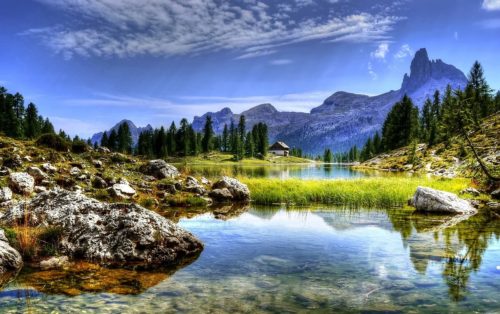How Nature heals the body soothes the soul

Ever wondered why most popular vacation destinations are beaches, mountains, valleys, forest resorts?
Ever wondered why morning and evening stroll spots are gardens, early morning walks are footpaths with trees lining both sides of the road, when vehicular movement on the road is minimal?
Ever wondered why when one is emotionally distraught and unable to grasp the reality of the situation, the calm company of nature is sought?
Ever wondered why the sunrise and sunsets with the chirping of the birds declaring the beginning of the day or the close of the day feels so good? The sounds or even the sight of the birds like the flight of birds along the skyline warms the heart?
Nature heals. Nature Calms. Nature can awaken the innermost feelings of happiness and peace.
Environmental Psychology has gone a long way proving this fact (Bell, Fisher, Baum, Greene, 1966)
Study Nature, love nature, stay close to nature, it will never fail you.
Forest Bathing, or Shinrin-yoku, as it is called in Japan, is famous way of spending time in nature. Research has shown that people who practice forest bathing have optimum nervous system function, well-balanced heart conditions and reduced bowel disorders. Breathing in nature gives wholesome sensory awareness. When we spend time outdoors, we are more mindful of what we see, what we hear, what we smell and what we feel.
Nature helps in emotional regulation and improves memory functions. A study on cognitive benefits of nature found that subjects who took a nature walk did better on a memory test than the subjects who walked down the urban streets (Berman, Jonides, Kaplan, 2008).
Nature walks benefit people suffering from depression (Shern et al., 2014). Studies have shown that people suffering from mild to major depressive disorders showed significant mood improvement when exposed to nature.
These days our mad-material amassing-rat race has a “nature-deficit disorder” built into it. One of the significant loss that we face is the loss of connection to our natural environment. Staying close to nature improves physical, mental and spiritual well-being. Nature has the magical capacity to make us feel one with the universe, enlarging our views of who we are, where we belong and what would be most satisfying to engage in and enhances our sense of gratitude.
As Very beautifully said
“A walk in nature walks the soul back home” – Mary Davis
In my recent trip to Bhutan, I was amazed by the calm of the residents of the country. We stayed in a “home stay”. It is a physically hard life, staying on the slopes of a valley, with one family residing in an area spread over 20 acres of land. Early morning they wake up, feed fodder to the cow, give milk to the cat, look for new beginnings in the ever emerging saplings next to a plant, a tree, a bush that is yielding fruits or colouring the landscape with wondrous colours.
The food is mostly locally procured – Milk from the cow, vegetables from the vegetable garden, simple food, home made wine from rice etc. Happiness prevails in form of warmth they extend, the politeness they show, the generosity and kindness extended towards the staff they employ and humility of work. There is a sense of co-operative existence.
The hot stone bath experience surpasses any spa bath that one can imagine or make. The rocks are heated in bonfire and thrown in a wooden bathtub filled with water from the stream gushing down the mountains. Herbs and leaves add to the experience. Floating in the bath tub, surrounded by the sound of the waterfall and the sky changing colours as natures clock ticks with stars emerging gradually. Thus I was immersed in the experience of nature and in happiness.
No Wonder the phrase ‘gross national happiness’ was first coined by the 4th King of Bhutan, King Jigme Singye Wangchuck. He declared, “Gross National Happiness is more important than Gross Domestic Product.” in 1972.
Nature heals, nature calms, nature is ever embracing and loving towards us. Can we give some love back?
Reference – Positive Psychology.com
About Author:
Supriya Rajagopalan is certified counsellor, trained in counselling skills, life-skills, couple and family counselling, children and adolescent counselling, Transactional Analysis etc. Supriya works with individuals, couples and families and looks forward to being instrumental in helping them make the change they want to. She is a Nature Lover and an avid Gardening enthusiast.
